
by Mark Smiley | Apr 28, 2017 | General Featured
by Ruthy Wexler
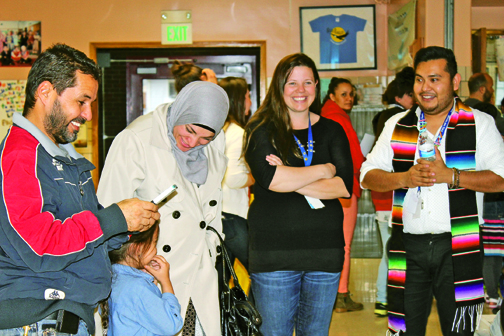 Residents of Virginia Village treasure the “back in time” feeling of their neighborhood, which was built in the 1950s. Ranch and split level-style homes, typical of that period, dot the quiet streets. There’s even a neighborhood school set back upon a wide lawn: Ellis Elementary.
Residents of Virginia Village treasure the “back in time” feeling of their neighborhood, which was built in the 1950s. Ranch and split level-style homes, typical of that period, dot the quiet streets. There’s even a neighborhood school set back upon a wide lawn: Ellis Elementary.
Ellis, however, is not typical of the 1950s.
While that decade was marked by conformity, roughly half the students at Ellis hail from countries other than the U.S.
In the 1950s, differences were kept under wraps. Not so at Ellis, where even as staff welcome newcomers to the American way of life, they encourage them to remember their own.
“We feel diversity is what made America strong. We know it is what makes Ellis stronger,” declares principal Nichole Whiteman, whose students hail from the nearby neighborhood — and from China, Mexico, Thailand, Ethiopia, Iraq, and a host of other far-flung places. “Our community is smarter, richer, more joyful and simply better because of our diversity,” Whiteman insists.
Some months ago, absorbing news of travel bans, Whiteman sat down with a few of her teachers and pondered how they could honor the school’s population. Ideas became a vision. Shortly thereafter — at 5:30 p.m. on March 22 — Ellis’s front doors opened to eager crowds. Ellis Elementary Celebrates our Diversity: A School without Borders Event had begun.
An Amazing Night
Ellis parent Mark Ginkel arrived in a kilt that bespoke his Irish ancestry. Baidan Alameri, in a fuchsia hijab, carried in a strawberry pink dessert. Other delicacies brought by parents — flan, magrud, kunata — made the cafeteria one of the evening’s most popular stops, beside the art exhibit, the Family Portraits and the resource fair, complete with immigration attorneys, healthcare workers  and representatives from the Denver Art Museum.
and representatives from the Denver Art Museum.
In the lobby, Ellis students introduced themselves on a video. “My name is Ibrahim; I speak English and Arabic because my family is from Morocco.” “My name is Alex, I speak Burmese because my family is from Burma.” The tag line was what each child wished others knew about their culture; e.g., “I wish you knew that in our culture, we ride elephants.” One little girl said, “I wish you knew that Mongolia is similar to America.”
In the auditorium, young authors read original compositions. A rapt audience heard 10-year-old Jadea Swindler proclaim, “I want to be a singer and a dancer … Never give up, what you want and what you dream for!”; Karla Lozano and Ruth Rosas ask, “Promise me something, never judge someone by their color or the language they speak” and two high school boys recite earnest poetry: “This is not a revolution of hate and revenge/ It’s a revolution of love, of justice. … This is my American dream.”
Giddy with goodwill, attendees beamed at each other in the halls. “It was an amazing night,” Whiteman recalls. “There was such a feeling of hopefulness and togetherness. I hope to fill the halls of our school with that feeling every single day.”
The Whole Picture
Whiteman has her work cut out for her. Besides endeavoring to create a veritable Peaceable Kingdom, she’s got to worry about test scores.
In the Denver school system (DPS), children take annual tests which compare their academic knowledge with same-age peers across the state. Schools are given a numerical rating based on the average of all their students’ scores. When educators speak of “high” or “low performing” schools, this rating is what they mean. But how can Ellis — with many students fresh from traumas like poverty and a sudden absence of the familiar, with a good chunk of them grappling with English as their new language — be rated accurately?
School ratings are posted without comment. For its low score, Ellis wins only a C- from Greatschools.org, only one star from Schooldigger.com. (A more comprehensive analysis on the DPS site ranks Ellis only as “challenged.”)
But if one looks (clicks) further, reviews voicing profound satisfaction stream into view. “My son has attended Ellis since 3rd grade. He is a GT [Gifted/Talented] student … I cannot say enough about the teachers’ abilities and drive to educate … “
“This is a school full of wonderful teachers and committed staff. It is a school for learning ….”
“This school is a GEM!! I have had opportunities to send my son to different schools but elected to keep him at Ellis due to their ability to keep him academically challenged … “
“Unfortunately,” Whiteman observes, “when a school is judged primarily on one standardized assessment and that’s what gets publicized, people are missing a huge piece of the puzzle.”
Building Character As Well As Test Scores
Which is not to say Whiteman doesn’t place importance on testing. “We work hard to increase academic outcomes … Our local data show that our students are improving.
“We soar toward excellence in academics and also in character development,” she emphasizes. “We teach values: integrity, perseverance, curiosity, optimism, respect and compassion.”
“I like how they focus on character development,” says Jim Moody, whose son is in second grade at Ellis. “It permeates every part of the school.”
Former Ellis parent Steve Garcia attests, “My son learned leadership as well as academics.”
Another parent states, “At Ellis, I know [my child’s] emotional well being is taken into account by every adult he comes into contact with.”
A Noble Experiment
It seems almost too great a coincidence that Ellis Elementary shares the name of the famous immigrant gateway in New York. Whiteman notes, “It’s wonderful to see friendships where the color of skin or religion is clearly just not a factor.”
Some parents see how such friendships can shape their child’s future. One writes, “At Ellis, my son has the opportunity to navigate cultural and linguistic differences. The connections he makes because of this cannot be taught, they must be lived and experienced. I feel confident he will leave with a dedication to humanity that will prepare him for the challenges of our global community.”
Brooke Webb, who recently became the Director of Ellis’s Parent Teacher Organization (PTO), agrees that Ellis affords rare opportunities. “A few years ago when our daughter was Kindergarten age, we turned to Ellis because we like supporting our neighborhood school. Then Olivia began and I got really impressed: academic excellence and this amazing celebration of diversity!”
Webb would like more of her neighbors to see Ellis’s  value. For though the school is located in Virginia Village, families don’t have to send their kids there.
value. For though the school is located in Virginia Village, families don’t have to send their kids there.
Choosing Ellis
“Within DPS, parents have this thing called choice,” Webb explains. “They can choose any school within the system. Many parents choose schools that have more white faces.”
There are common misconceptions, Webb says. “People say, ‘Don’t you feel funny being the minority?’ But we’re not; there’s like 20 percent of everything represented. The majority/minority paradigm doesn’t have a chance to get started! And, ‘Isn’t your child held back because all the attention goes to the kids who don’t speak English?’ But the truth is, there’s no additional time given to kids learning English. They get that in language development classes.
“Our belief in our choice is reinforced by all the terrific ben efits we see Olivia getting.”
efits we see Olivia getting.”
Right now, Ellis Elementary is supported by dedicated staff, a recently revived PTO and a population that draws equally from a stable neighborhood and a changing world. The school faces challenges. Gentrification may close affordable housing in the area. Low test scores might dissuade potential parents.
“But we love the school and we’re up to it,” Webb says. “I see strollers on the streets here, so many kids who’ll be school age soon. I want to educate them! I want to tell them just how great their neighborhood school is.”
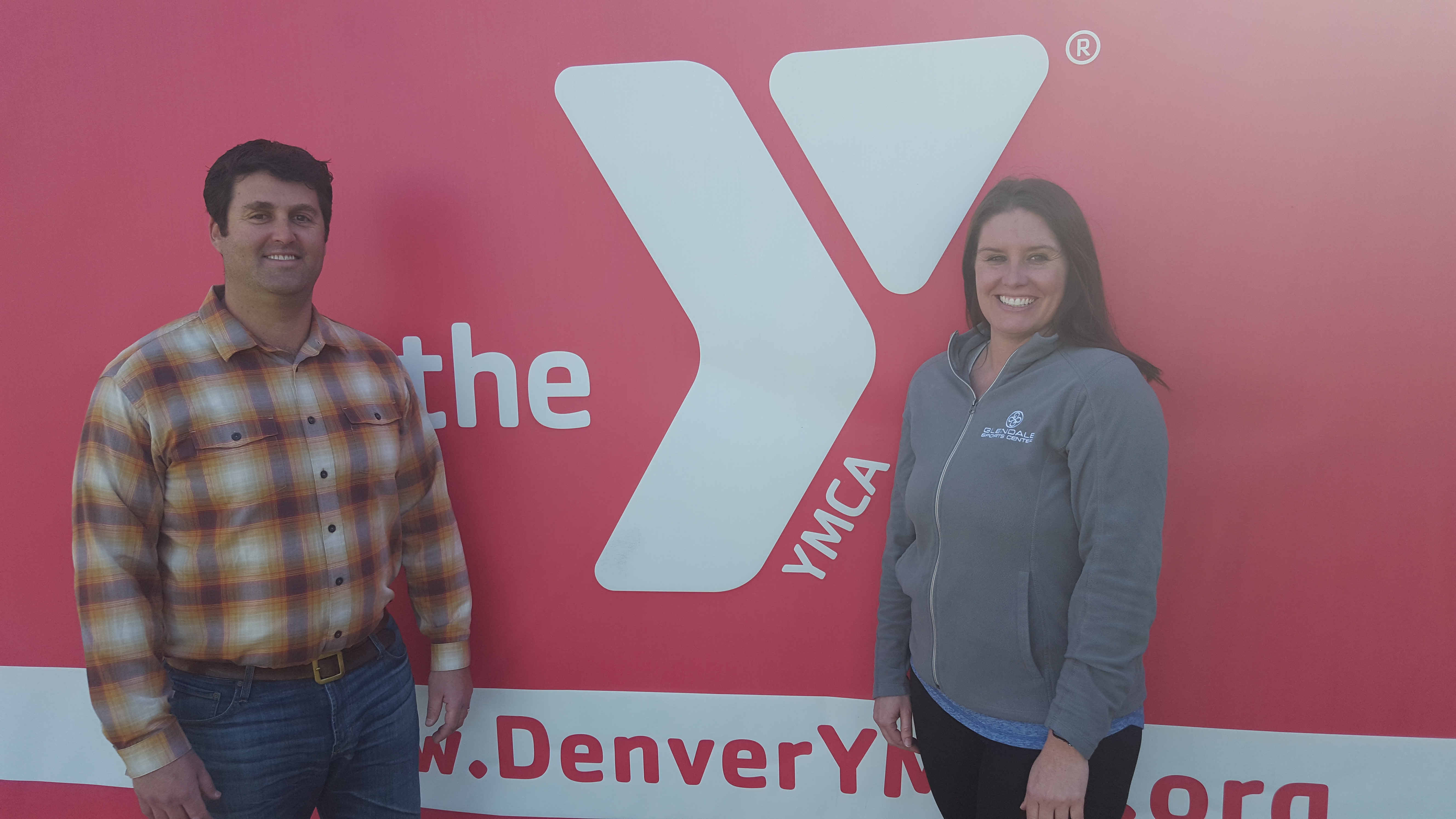
by Mark Smiley | Mar 24, 2017 | General Featured
by Mark Smiley
Every year, the Glendale Sports Center managed by the YMCA raises money to help more families and individuals access the Y’s programs and activities for youth development, healthy living, and social responsibility. The Annual Campaign can make a real difference in the lives of people throughout Glendale.
A major contributor to this campaign since arriving in Glendale a few years back is Urban Phenix. Urban Phenix is the management company representing three complexes in Glendale and three in Denver. With headquarters in Glendale, Urban Phenix understands the importance of supporting the community.
“We value our partnership with the Glendale YMCA,” said Nick Lazzara, President of Urban Phenix. “The fact that they o ffer an $8 per month membership for Glendale residents is a huge selling point for us.”
ffer an $8 per month membership for Glendale residents is a huge selling point for us.”
When the City of Glendale built the Glendale Sports Center, it retained the YMCA to manage the facility. In the past, some residents had little to no idea they lived within the boundaries of Glendale, as Glendale and Denver boundaries can be in some areas, highly irregular. When this plan was instituted many more people who thought they lived in Glendale, realized they live in Denver. The local zip code, 80246, is the same which adds to the confusion.
“We have people that come in all the time and swear that they live in Glendale to take advantage of the discount,” said Lynn Taylor, Mem bership Director. “We have seen it all when it comes to people claiming they live in Glendale.” The Sports Center also offers a $40 per month membership for those who work in Glendale. An adult Denver resident pays $50 per month.
bership Director. “We have seen it all when it comes to people claiming they live in Glendale.” The Sports Center also offers a $40 per month membership for those who work in Glendale. An adult Denver resident pays $50 per month.
Urban Phenix’s philanthropic efforts don’t begin and end with the Glendale Sports Center. They also have a Give Back program whereby any resident that lives in one of the complexes they manage and has a cause they support, Urban Phenix will help sponsor an event if the resident gets 10 people to participate. “It’s our way of encouraging philanthropic efforts amongst our residents,” said Lazzara.
Another cause Urban Phenix supports is Colorado UpLift. Colorado UpLift was founded in 1982 by Dr. Kent Hutcheson as a summer jobs program for urban, at-risk youth. Dr. Hutcheson’s passion was to help urban young people find hope in hopeless circumstances.
Colorado UpLift establishes a “pipeline of influence” model, in which UpLift staff members provide consistent instruction for students from elementary school through college age and have a better chance to emerge as successful, productive young adults. Since their inception, they have served approximately 30,000 urban youth in the Denver Metro area, and will impact more than 5,600 students in 2017. “98 percent of the seniors graduate that went through this program,” said Lazzara.
Colorado UpLift has an event scheduled May 4, 2017, from 5:30 to 9 p.m. at the Infinity Park Event Center in Glendale. The 2017 event titled Urban Masterpieces will feature an evening with food, music by Hazel Miller, and stories of lives changed by a positive influence.
The Glendale Sports Center hopes to expand its partnership with Urban Phenix as the company establishes more of a presence in the greater Glendale community. Partnerships such as these are vital to the YMCA and the programs it offers year-round.
For more information about Urban Phenix, visit www.urbanphenix.com, for more information about the Glendale Sports Center, visit www.denverymca.org/glendale, and for Colorado UpLift, visit www.coloradouplift.org.

by Mark Smiley | Mar 1, 2017 | General Featured
Over 4,000 People Attend Travel Event
by Charles C. Bonniwell

Most Coloradans associate AAA with roadside assistance services which is understandable since the company was founded in Chicago, on March 4, 1902, as the American Automotive Association. But in Colorado and across the country people are increasingly becoming aware that AAA is also the largest travel agency in the world. At a time when small independent travel agencies have been driven out of business as a result of the Internet, AAA has found a unique niche helping vacationers and travelers all over the world.
“We create a travel experience,” noted Joe Maloney, Vice President of Travel Operations for AAA of Colorado. “Anyone can go online to book a flight or get a hotel room, but what we can do is make sure you have a tremendous time from start to finish. We know everything from the best restaurants with the best prices to the top night clubs and entertainment virtually anywhere in the world. If a person wants the best price and most fun on a cruise, we can make sure that happens.”
Maloney also noted, “We support our members throughout any trip they may take. What happens if you miss a connection or a flight is canceled? Our agents are available 24/7 to assist you no matter what the emergency may be.”
Apparently the word is getting out because over 4,000 people showed up at the United Club inside Sports Authority Field at Mile High for AAA’s 2017 version of Vacations Showcase on a sunny Saturday afternoon February 4, 2017. Individuals and families were able to discover some of the worldwide travel options available to them through AAA as well as special show deals and expert travel planning advice.
There were over 60 exhibitors at the event who, at times, themselves appeared almost overwhelmed by the large, enthusiastic crowds that came to the 2017 show. Joseph Eastep from Oceania Cruises declared, “This has been a fantastic show. Absolutely tremendous turnout. We ran out of every brochure we had.”
Attendee Elayne Raksnys was ecstatic about the event, “Amazing, amazing show. Oh my goodness. Non-stop people for over five hours.”
Nicole Hunt, who attends scores of travel shows all over the country for Uniworld, a firm that specializes in boutique river cruises, exclaimed that AAA Colorado’s event was “the best travel show I have been to all year — bar none.”
Kim Essan who represents the Caribbean islands of Antigua and Barbados noted that the Colorado event even out performed the New York Times travel show she had just attended and that the Colorado event, “made my day.”
Emphasizing the importance of the travel aspect of AAA of Colorado was the fact that the company’s CEO and President Linda Cavanagh mixed and mingled with the crowds the entire six hours of the event. “People who want to travel and create their own dream vacations are wonderful individuals to be around. They are full of such incredible enthusiasm and energy. The show began and was over in what seemed like a just short moment in time,” said Cavanagh.
AAA, of course, continues to offer membership in its automotive club that made the company a household name. Membership includes not only roadside assistance but also warranty programs, car battery service, approved auto repairs as well as discounts on NAPA auto parts and accessories. The company can also offer life insurance, long-term care insurance, travel and trip insurance and various other services.
Those interested in becoming members of AAA of Colorado can go to its website colorado.aaa.com or call 303-753-8800.
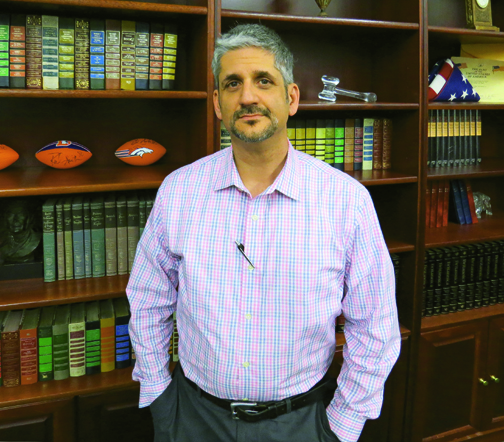
by Mark Smiley | Jan 30, 2017 | General Featured
 by Mark Smiley
by Mark Smiley
Step 13 has hired only its third Executive Director in 30 years, Paul Scudo. Scudo who had served as Director of Programs the last two years was hired after the search committee narrowed down the field of candidates to 12. He officially began his role in October 2016, but he was serving on an interim basis since last June. Peter Droege who was the Executive Director left the organization in May 2016.
For more than 30 years Step 13 has helped men overcome addiction and become contributing members of society through a “tough love” residential program that requires sobriety, work, and accountability. There is a zero-tolerance policy for drinking or drug use, and work is required from day one in the program.
The organization was founded by Bob Coté and his legacy lives on at the organization. Scudo not only acknowledges this, he embraces it. “We are privileged that for years Bob broke his back and did whatever it took to keep the doors open, help men out, and get the name Step 13 out in the community, and generate a donor base,” said Scudo.
Scudo was born in Philadelphia, and lived there until he was 16 when his parents moved to Charlotte, N.C. After graduating high school, he went to Michigan State University and got a degree in Hospitality Business. It is here where he met his two best friends who eventually saved his life and put him on the path to recovery. He moved to Denver and worked for the Hyatt Hotels Corporation and then the Hilton Worldwide Holding as Regional Director of Sales and Marketing.
It is in this position where Scudo made a comfortable living. He had an attractive home in Park Hill, with a loving wife, and for those who knew him, a pretty good life. But, Scudo kept a dark secret. He had become addicted to cocaine and alcohol and his addiction took a turn for the worse starting in 1998.
Five years later, in 2003, he was arrested for possession of narcotics and put into drug court. Even with the possibility of having a felony on record and going to jail, Scudo could not stop using drugs.
He continued to test positive on court ordered probation tests. The court would put him in jail for two days once a month for four years. Because Scudo showed up in a business suit and made seemingly valid excuses, they would continue to give him opportunities.
Finally, those opportunities would run out as his excuses were no longer accepted. In 2007, the court finally revoked deferred judgment, charged Scudo with a felony, and sent him to jail for six months. His 18-month probation that stretched to four years now converted into jail time.
After losing his job and serving his sentence, his first phone call after being released from jail was to his drug dealer. With no job and no income, but with a large amount of money in savings, a 401K, an IRA, Scudo became a hermit in his Park Hill home. He burned through $200,000 in 18 months, stopped paying the mortgage and all other bills, aside from the phone bill, so he could contact his dealer.
After the mortgage company and police officers came to his door and warned him to pay his mortgage or be evicted in 30 days, Scudo turned to doing more drugs.
After 30 days had expired, police officers came into his home and told him he had 10 minutes to gather what he could.
“I never, in my mind, believed I was going to lose everything,” said Scudo. Every other possession he had accumulated in his 40 years on the planet was thrown in a dumpster.
All of a sudden, Scudo was homeless. Over the next two years, he would hide in alleys and wooded areas. He would only go to populated areas to steal food from a grocery store or to get change to get a bottle of alcohol so that he could drink and numb the pain.
After being on the streets for two years, Scudo describes what was a spiritual intervention. He was in an alley and his two best friends from his days at Michigan State University came down the alley and said, “We finally found you, are you ready for help?” Scudo looked up at them and said yes but he couldn’t afford it. They told him they had it taken care of.
They put him into a drug addiction treatment center called CeDAR. CeDAR is integrated into the University of Colorado Hospital and is an expensive treatment facility. Scudo remained at CeDAR for three months.
He then moved to the Oxford House, a sober living home. He remained at the Ox-
Continued on page 15
Continued from page 5
ford House for a year and found it difficult to find work. A friend from his alcohol recovery fellowship group who owned a handyman business hired him to be his assistant. He worked for him for a year and started to volunteer at CeDAR.
His volunteer work would eventually lead to a full-time position as Recovery Care Manager at CeDAR after more education. He worked at CeDAR for three years and during this time was asked by the Anschutz Foundation (who funds both CeDAR and Step 13) to speak to the men of Step 13. Scudo volunteered for six months at Step 13 until one day Droege and then Board Chair Wendy Bergen pulled Scudo aside to ask if he would be willing to build a recovery program.
After volunteering to launch this program, it became clear it was going to take more of a full-time effort. Scudo was then hired in 2014 to be the Director of Programs for Step 13. “There was something in my heart telling me to do this,” Scudo said.
“I have a picture of Bob [whom he never had the chance to meet] on the wall in my office and I look at it every day to remind me I am lucky that he did all the really hard groundwork to get this organization where it is, and staying true to three key principles: sobriety, work, and accountability,” said Scudo. “While there’s been some change, the core philosophies remain the same. We are going to remain true to Bob’s original principles and we still believe accountability, self-sufficiency, partnered with work and individual recovery is how an individual restores their dignity and self-worth. We are going to help as many men as we can.”
Matthew Saks, chair of the board of Step 13 commented, “Paul Scudo is the ideal leader to take Step 13 into the future. He brings to this work so many important qualities: a deep sense of personal integrity, an understanding of nonprofit organizations and, most importantly, a profound passion for helping men in their struggle with addiction. In his work as program director, he has already transformed our recovery program into a national model for success. Having him in place as Executive Director ensures our organization’s sustainability and impact for many years to come.”
Scudo now lives with his new wife of four years, Cynthia, who has eight grown children and 20 grandchildren. Scudo, now 50 years of age, is appreciative for all of the gifts in his life. “I’ve changed the way I live my life,” said Scudo. “[It’s] about being of service and caring for other human beings. [It’s] how I interact with the average person I come in contact with.”
Scudo has a vision of where to take Step 13. He wants to open sober living homes and give men that are living at Step 13 that next step. He would also like to open up more Step 13 facilities across the state to help men in need.
“I’m humbled and I’m grateful for the opportunity to lead Step 13 into the future and in doing such, I’m going to stay true to Bob’s principles.”
Scudo is active in an alcohol recovery fellowship as a world delegate. He also enjoys camping, hiking, golfing, reading, bike riding, and movies. For more information on Step 13, visit www.step13.org.
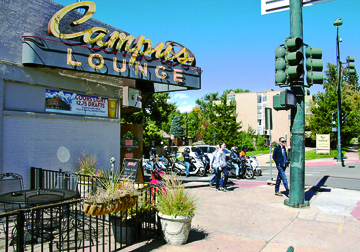
by Mark Smiley | Dec 22, 2016 | General Featured
$500,000 In Renovations But The Name, Sign, Bar And Booths Stay

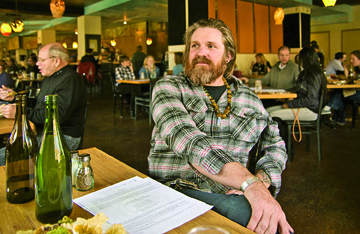 Home to an eatery since 1946, the corner of Exposition and University first opened as the Bel-Air and switched names to the Campus Lounge in 1949. Former Denver University and NHL hockey player Jim Wiste bought the business and real estate in 1976. The restaurant is expected to reopen as early as this month under new ownership.
Home to an eatery since 1946, the corner of Exposition and University first opened as the Bel-Air and switched names to the Campus Lounge in 1949. Former Denver University and NHL hockey player Jim Wiste bought the business and real estate in 1976. The restaurant is expected to reopen as early as this month under new ownership.
The sale of the Bonnie Brae landmark restaurant was announced to much fanfare with the last day of operation under the old ownership on September 25, but everything since that event has been shrouded in mystery, including who actually bought the business.
It was initially announced that a partnership led by St. Charles Town Company headed up by its president Charlie Woolley had acquired the Campus Lounge property along with fiction writer and vegan restaurateur Dan Landes. But a check of the real estate records by the Colorado Real Estate Journal showed that the property was, in fact, acquired by Exposition Avenue Properties LLC for $1.9 million with that entity headed by Wayne E. Barrett. Barrett is a vice president of ProLogic now headquartered in San Francisco but based in Denver until 2011.
“Wayne is an industrial real estate rock star,” Woolley told the Real Estate Journal. Barrett had hoped to remain anonymous in the Campus Lounge deal, Woolley explained. Furthermore, we’re told that Barrett is Woolley’s partner in another iconic restaurant, Wazee Lounge & Supper Club. Woolley bought the Wazee in 1997 but previously hadn’t disclosed Barrett was his partner. Since 1974 the Wazee Supper Club has been a landmark restaurant in Denver’s historic Lower Downtown district. Located at the intersection of 15th and Wazee Streets, it was founded by Angelo and Jim Karagas of My Brothers Bar fame.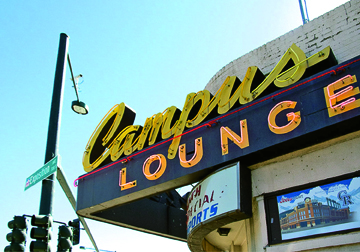
In the case of Bonnie Brae’s Campus Lounge, Barrett had already put the deal together when he called Woolley to participate in it. “He really likes these cool, iconic places,” Woolley told the Colorado Real Estate Journal of Barrett. “He has a real passion for them.”
But they needed someone to actually run the restaurant. Woolley was then introduced to Landes by Todd Colletti, owner of the Buckhorn Exchange. The storied steakhouse — Denver’s oldest restaurant — is where mounted game gaze on dishes of yak, ostrich, elk and Rocky Mountain oysters.
The More Things Change — The More They Remain the Same
Opening under the same name — possibly as early as this month — the Campus Lounge is keeping the horseshoe bar, the booths plus the Campus Lounge sign. To continue the legacy of the Bonnie Brae eatery, the new owner is spending approximately $500,000 on renovation.
Woolley says the eatery will pay homage to the car efree ambiance Jim Wiste created for the generation of families, patrons, and friends who frequented his beloved lounge.
efree ambiance Jim Wiste created for the generation of families, patrons, and friends who frequented his beloved lounge.
Landes’ vegan restaurant City O’ City is doing well in Capitol Hill, and Landes reportedly wasn’t looking for another restaurant but the Campus Lounge seemed too good to overlook. “It’s got all of the elements — the right neighborhood and a big kitchen — to get a return on investment,” he believes.
Meet Campus Suspect
Landes’ reputation as a Denver touchstone began as a restaurateur when he founded WaterCourse Foods in 1998 and City, O’ City in 2006. His other lifelong passion is for literature that is always brewing just beneath the surface. In 2012 he released his debut novel, Joonie and the Great Harbinger Stampede, a creation myth about the birth of consciousness, told through the lives of prairie animals. He sta rted his own publishing company, Suspect Press, in 2013 along with Brian Polk and Ken Arkind, and has published several of his own works since then.
rted his own publishing company, Suspect Press, in 2013 along with Brian Polk and Ken Arkind, and has published several of his own works since then.
The old Campus Lounge was famous for its burritos, burgers and beer. What the new menu will be is not yet revealed, but you can expect a full review of the revived restaurant in the next issue of the Glendale Cherry Creek Chronicle.

by Mark Smiley | Nov 21, 2016 | General Featured
by Ruthy Wexler
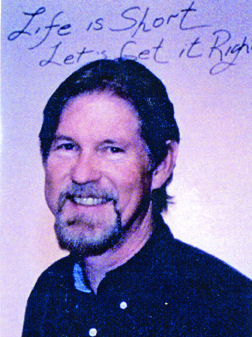 The John Hand Theater in Lowry is a singular Cherry Creek Valley experience. Welcomed into a tiny lobby, you feel . . . instantly at home. Sipping a glass of wine in your seat, you feel . . . curiously content. Watching talented actors give their all, you are stimulated, moved and somehow, included. When you leave, you feel . . . the opposite of alone.
The John Hand Theater in Lowry is a singular Cherry Creek Valley experience. Welcomed into a tiny lobby, you feel . . . instantly at home. Sipping a glass of wine in your seat, you feel . . . curiously content. Watching talented actors give their all, you are stimulated, moved and somehow, included. When you leave, you feel . . . the opposite of alone.
It’s exactly what John Hand had in mind.
Who is John Hand?
A charismatic guy with a million ideas, John left his revitalizing mark all over Denver. He ran an antique shop, owned a deli, bought and sold real estate, founded Colorado Free University . . . and that’s the short list. When the Lowry Air Force Base began its redevelopment in 1999, John, then 52, bought the base’s firehouse as a satellite building for CFU — but soon, he had another idea.
Love Of Theater
John loved the theater. He’d acted in plays, even written a musical, was especially drawn to how dramatic collaboration brought everyone more alive. The firehouse would be a community theater.
He hired an architect, drove to California to pick up a batch of old theater seats and soon, fellow enthusiasts joined him to sing and read plays. A core group emerged, an amateur acting troupe. John’s younger sister Helen, busy with her own career as a psychologist, came to watch productions. Of all his ventures, Helen saw, the theater was John’s center.
“I felt happy that John was living his dream,” she recalls. “And a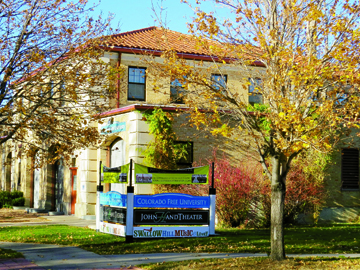 lways, amazed that he could do so much.”
lways, amazed that he could do so much.”
By 2004, light and sound equipment still in a cubbyhole, John was excitedly planning his first big play. The Ride Down Mt. Morgan, an early work by Arthur Miller, concerns a bigamist who must explain his life choices when both wives arrive at his hospital bed.
“In some ways,” Helen muses, “that play was reflective of John’s life. So many balls in the air…”
The balls all came crashing down on March 28, 2004, when a total stranger — a 19-year-old girl with an angel face and demon hallucinations — entered his home and stabbed John Hand to death.
Brother’s Dream Brought To Life
Helen could not accept such a meaning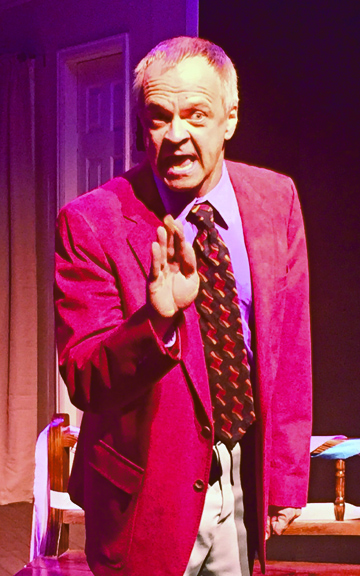 less end to her brother’s life. She wanted to honor him — but how? John had always been the one with ideas. “He was so articulate, so vibrant. I was a little more . . . retiring. I was dazzled by him. But he was a good big brother.” Helen laughs, remembering the time John taught her to fight back against a neighborhood bully. “Once we got outside, I sat on the ground and wouldn’t go any further. I let him down.”
less end to her brother’s life. She wanted to honor him — but how? John had always been the one with ideas. “He was so articulate, so vibrant. I was a little more . . . retiring. I was dazzled by him. But he was a good big brother.” Helen laughs, remembering the time John taught her to fight back against a neighborhood bully. “Once we got outside, I sat on the ground and wouldn’t go any further. I let him down.”
She would not let him down now. Helen went outside her comfort zone to ask for contributions so John’s big play could be produced. “People loved him, they were inspired by him, and so they gave.” Six months after John’s death, Firehouse Theater Company presented The Ride Down Mt. Morgan with professional sound and lighting.
She’d held up her brother’s dream. Now Helen couldn’t bear to see it die. She cut back her private psychology practice to take over the reins of Colorado Free University and the theater as well.
“At first it was spotty,” she recalls. “We would lose people, lose energy. I had to rely on others to mount productions.” But soon, Helen discovered that she liked reading scripts, enjoyed the actors. She began to take a more active role. “I’d entered a field where I had no experience or expertise and I found . . . tremendous satisfaction. And joy.”
Second Theater Company
To keep the theater afloat, Helen rented it out to local groups. In 2007, Spotlight Theater Company came on board as a regular renter. The two groups sparked each other. Since Firehouse was producing only four plays a year, they arrived at the arrangement we see today: Spotlight and Firehouse present alternate productions at the John Hand Theater.
“The way the shows dovetail from company to company is seamless,” sa ys Bernie Cardell, artistic director of Spotlight. “It’s a splendidly diverse program. Spotlight is more comfort food, makes you laugh, goes down easy. Firehouse explores the human heart.”
ys Bernie Cardell, artistic director of Spotlight. “It’s a splendidly diverse program. Spotlight is more comfort food, makes you laugh, goes down easy. Firehouse explores the human heart.”
Pat Salas, a season subscriber to both companies, says, “When I take people to the John Hand, they’re like, ‘Who? Where are we going?’ But then when we see the play, they always want to go back.”
What makes the productions so special? For starters, the theater. At 89 seats, it’s an intimate — and well designed — setting. “It has enough height and depth that you don’t feel crowded as an actor,” says Emma Messenger. “The acoustics are exceptionally good, fantastic for subtle acting. But the best part about the John Hand is the supportive people who work there. You always feel so cared for — and that nurturing feeling translates to better performances.”
“Why is the acting so good?” muses Bernie Cardell. “You just do better work when you’re feeling part of a family, right?”
This family is purposely inclusive. In the casts of both companies’ shows, there’s often a wide range of experience — another of John’s legacies. “My brother wanted to stage good productions, but he also wanted to provide a place for people to develop their skills,” explains Helen. “So we give opportunities.”
Not just beginners, but veterans benefit. Lauded actor Andrew Uhlenhopp recalls his role as King Henry IV in The Lion in Winter as “a challenge, that I faced with Helen’s great support. She involves herself in the theater in such a way that one feels inspired to grow.”
Helen Rocks
Guiding board meetings, raising funds, attending rehearsals — Helen is now the one with lots of balls in the air. “I’ve even seen her up on the roof checking for leaks,” says actor and set-designer Jeff Jesmer. “Helen rocks!”
“In the process of keeping John’s dream alive,” Helen says simply, “I was transformed.”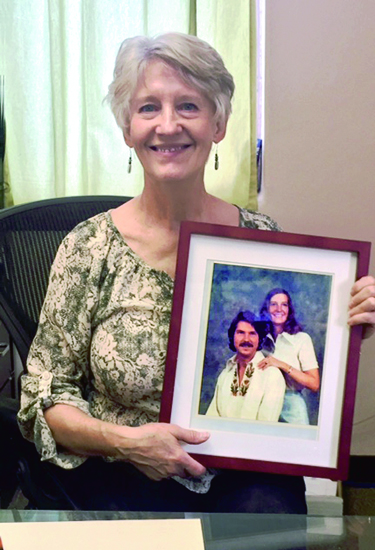
So was this tiny spot in Denver.
John’s murder ripped a hole in Helen’s family. What she ended up doing was creating a new family, whose heart is a powerful combination of John’s inventive boldness and her own loving kindness.
On a recent evening, the house was full, the lights had dimmed, when a young couple entered the theater, obviously on a special date — and dismayed at the lack of two seats together. Immediately, three individuals stood, conferred, rearranged — then pointed the couple to a now empty pair. After a burst of affectionate laughter, everyone settled in to watch the show.
Upcoming Season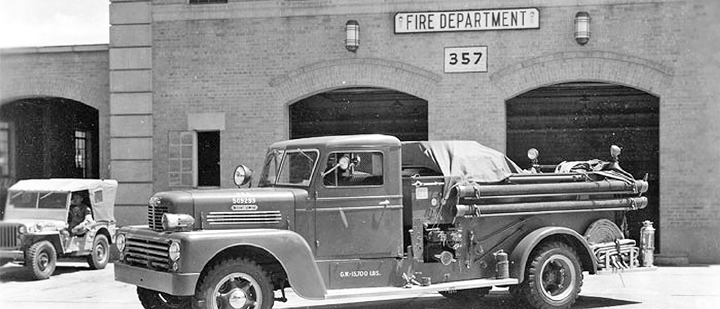
Theatergoers who want to enjoy the intimacy of the John Hand Theater can look forward to a rich menu in 2017. Helen is particularly proud of Firehouse’s January show: Becky’s New Car, by Stephen Dietz. “The playwright is local, the play is sharp, funny, yet touching and thought-provoking . . . exactly the sort of production John loved.”
In the spring, another sharp comedy, Crimes of the Heart will premiere. And in the summer, Helen is pleased to present an original work by Firehouse board member Debbie Montgomery, Rock of Aging, a parody of ’60s and ’70s bands, with familiar songs hilariously rewritten to address the humiliations of old age.
Alternating with the above is Spotlight’s run of funn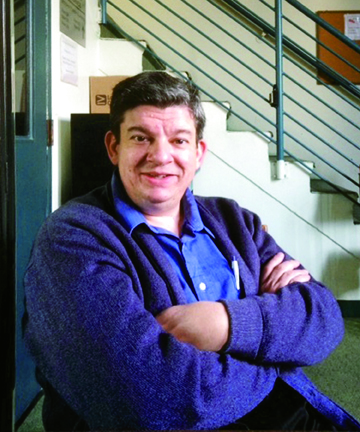 y, scary and heart warming. In February and March, Sabrina Fair (remember the movie with Audrey Hepburn?); in May, Scotland Yard by Jeffrey Hatcher; and that well-known gem On Golden Pond completes the season.
y, scary and heart warming. In February and March, Sabrina Fair (remember the movie with Audrey Hepburn?); in May, Scotland Yard by Jeffrey Hatcher; and that well-known gem On Golden Pond completes the season.
Looking to future seasons, Bernie Cardell sees Spotlight still offering its comfort fare of classics, mysteries, comedies and farces, but spiced with some more challenging works. Firehouse Theater Company will keep exploring the vagaries of human relationships, leaving audiences thinking and talking as they leave the theater. And they both intend to stay at the John Hand.
Visit www.johnhandtheater.com to find links to both company’s shows.

 Residents of Virginia Village treasure the “back in time” feeling of their neighborhood, which was built in the 1950s. Ranch and split level-style homes, typical of that period, dot the quiet streets. There’s even a neighborhood school set back upon a wide lawn: Ellis Elementary.
Residents of Virginia Village treasure the “back in time” feeling of their neighborhood, which was built in the 1950s. Ranch and split level-style homes, typical of that period, dot the quiet streets. There’s even a neighborhood school set back upon a wide lawn: Ellis Elementary. and representatives from the Denver Art Museum.
and representatives from the Denver Art Museum. value. For though the school is located in Virginia Village, families don’t have to send their kids there.
value. For though the school is located in Virginia Village, families don’t have to send their kids there. efits we see Olivia getting.”
efits we see Olivia getting.”

















